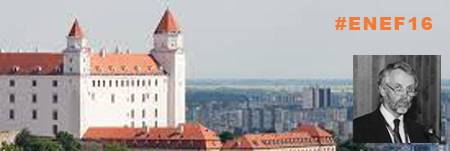Opinion column of Philip Kearney
Together with three otherNuclear Transparency Watch colleagues I attended the European Nuclear Energy Forum (ENEF) conference in Bratislava on October 3-4. This opinion piece is anevaluation of the the merits of the on-going NGO involvement in ENEF activities. Some years previously NGO delegates from a number of organisations had decided to withdraw from ENEF due to frustration at the failure to include their perspectives in the proceedings and the outcomes of the meetings. NGOs are now responding invitations from the European Commission and the Forum to re-engage in its deliberations.
The context in Bratislava was welcoming, the conference competently organised and the setting and logistics well matched with similar events elsewhere. The question to be considered was whether the approach and format facilitated inclusion, multiple perspectives and a sense of equality between stakeholders.
I would argue that in spite of genuine attempts to be inclusive, the use of a traditional conference format militates against achieving those outcomes either at the process level or in terms of generating engagement and innovation.
It was noteworthy that in the opening speech on the first evening by Commissioner Šefčovič and in the remarks by the prime ministers, the key EC officials and others on the second day, there were multiple references to the importance of civil society participation and the fact of the web-streaming was continually mentioned as an indication of ENEF commitment to transparency. These added dimensions do constitute improvements and are acknowledged. Unfortunately, they do not constitute a sufficient breakthrough in terms of qualitative enhancement of public participation.
The format of the event was unimaginative, too conventional and traditional. Panels of speakers giving formal presentations with minimal audience involvement simply results in reiterating much that is already known, does not stimulate engagement or participation and basically keeps things the same.
The moderator, Ms Melinda Crane, was excellent and skilful and did a great job within the significant constraints of the format. However, a World Café (or similar) model, using small groups with a much larger civil society participation, would re-energise the format and make the event much more engaging, innovative and relevant.
The inclusion of a few civil society representatives is tokenistic and at too small a scale to have any significant impact. To be fair there were at least four speakers from the CSO sector which constitutes quite a significant proportion, but the traditional format can absorb a high degree of ‘counter-views’ without any significant moderating effect on the over-riding concerns and pre-occupations of the main players in the Forum whose perspectives continue to dominate the narrative.
It will require a significant redesign of the format to make wider participation relevant and meaningful. There were relatively few of ‘us NGOs’ in the audience but my point is that even if we were many more it would not have made a substantive difference if the format remains linear and non-interactive.
It is clear from the conclusions of the 10th Forum Plenary meeting in Prague in 2015 that the ‘crucial involvement of civil society’ is fully recognised and that the ‘general public acceptance deficit is a central issue to be addressed’. It is also clear from the 2016 Plenary that this has not translated yet into substantive engagement and involvement to achieve the ‘strong and effective participation of civil society’ spoken of in those same conclusions. There is quite some way to go.
In its recent communication “Nuclear Illustrative Programme ” (PINC) of April 2016, the European Commission states that “the EU legal framework requires increased transparency and public participation in nuclear issues, as well as improving cooperation between all stakeholders. The directives on nuclear safety, radioactive waste and radiation protection referred to above all lay down requirements on availability of information and public participation. (…) In addition, the Commission will continue to promote the dialogue between stakeholders in the European Nuclear Energy Forum”.
There is an openness to NGO engagement on behalf of the wider society. This has been demonstrated in the response to our various proposed changes and additions including:
- NGO speakers
- Participation of a second CSO representative on the steering committee,
- Independent moderators and
- Web-streaming.
These changes should now be built upon to include some of the points mentioned above but most particularly a fundamental redesign of the format to be genuinely participative and interactive. Specialist expertise in running more interactive, multi-stakeholder events should be engaged. Civil society representatives should be included at every level of the Forum’s work and in the planning and implementation of the conferences. To allow this, specific resources have to be dedicated to NGO resourcing, both in preparations and for participation.
Anything less, although well-intentioned, is merely tinkering with a tired formula and will not change it.
In summary:
My impression is that ENEF realises that the prospects for the nuclear industry are tied increasingly to its capacity to engage meaningfully with civil society. It has very limited expertise in effecting this shift and almost no imagination. NTW should urge ENEF to open up, democratise and modernise its processes and procedures and our continued participation should be contingent on them agreeing to such changes.
Philip Kearney,
Management Board,
Nuclear Transparency Watch
November 2016
